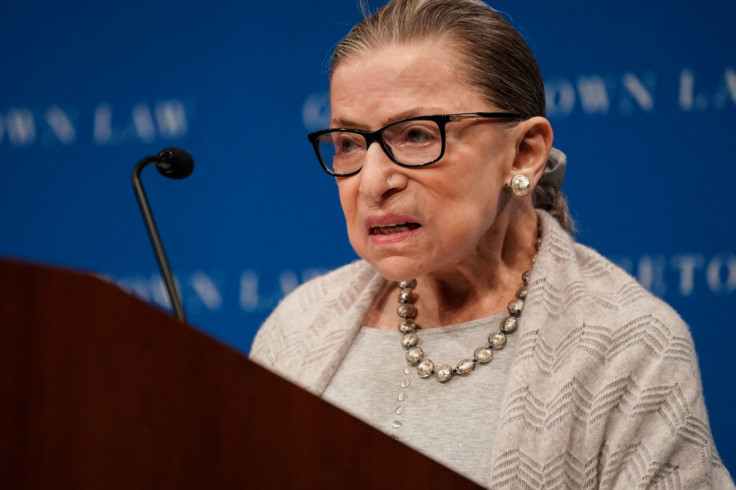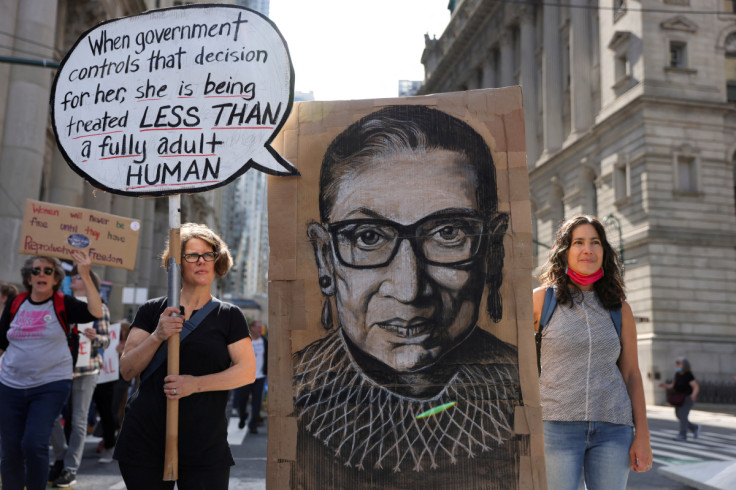A Transformed US Supreme Court Pays Tribute To Justice Ginsburg

Judges, scholars, lawyers, government officials and current U.S. Supreme Court members paid tribute to the late Justice Ruth Bader Ginsburg on Friday, honoring a liberal stalwart and women's rights pioneer whose 2020 death opened the door to a transformative rightward shift on the top U.S. judicial body.
A rare meeting of the Supreme Court Bar, comprised of attorneys admitted to practice law before the court, featured speeches from people who worked closely with Ginsburg including U.S. Solicitor General Elizabeth Prelogar, who argues cases for President Joe Biden's administration.
"Her life was a quintessentially American story," Prelogar said. "She was born to a family of immigrants, and grew up with modest means. She faced profound adversity and discrimination. Yet, through her intellect, hard work and force of will, she not only reached the top of her profession, she reshaped it. She broke barriers for those who came after her and she inspired multiple generations."
A similar meeting was held following the 2016 death of conservative Justice Antonin Scalia, a influential figure on the court whose memory looms large among conservatives just as Ginsburg's does among liberals. The two jurists were close friends who shared an affection for opera.
Ginsburg's death at age 87 after a bout with cancer was an inflection point for the court.
It enabled then-President Donald Trump to make a third appointment to the court - Amy Coney Barrett - who was rapidly confirmed by a Senate then controlled by his fellow Republicans. That gave the court a 6-3 conservative majority, further diminishing the power of its liberal bloc and paving the way for rulings like last year's decision ending the recognition of a constitutional right to abortion.
Trump also appointed conservative Justices Neil Gorsuch in 2017 and Brett Kavanaugh in 2018.
The conservative majority has shown no hesitation in taking up contentious issues, also including a ruling last year widening gun rights. Based on arguments held since their current term began in October, the conservative justices appear poised in the coming months to end affirmative action policies used by colleges and universities to increase campus racial diversity, further undermine a federal law barring racial discrimination in voting and enable businesses to refuse certain services to LGBT people based on constitutional free-speech rights.
Barrett was confirmed by Senate Republicans a week before the 2020 presidential election. Democrats accused them of hypocrisy after Republicans refused to act on Democratic President Barack Obama's nomination of Merrick Garland to succeed Scalia during a presidential election year in 2016.
Garland, a former federal appeals court judge who now serves as U.S. attorney general, was due to speak at a special sitting of the court following the bar meeting. Chief Justice John Roberts is also set to speak.
Ginsburg rose from a working class upbringing in New York City's borough of Brooklyn and prevailed over systemic sexism in the legal ranks to become one of America's best-known jurists. Appointed to the Supreme Court by Democratic President Bill Clinton in 1993, she provided key votes in landmark rulings securing equal rights for women, expanding gay rights and safeguarding abortion rights.
Ginsburg was the second woman ever named to the court, after Justice Sandra Day O'Connor. The court now for the first time has four female justices including Barrett and the three liberal justices, Sonia Sotomayor, Elena Kagan and Ketanji Brown Jackson, the latter being Biden's sole appointee.

© Copyright Thomson Reuters 2024. All rights reserved.





















